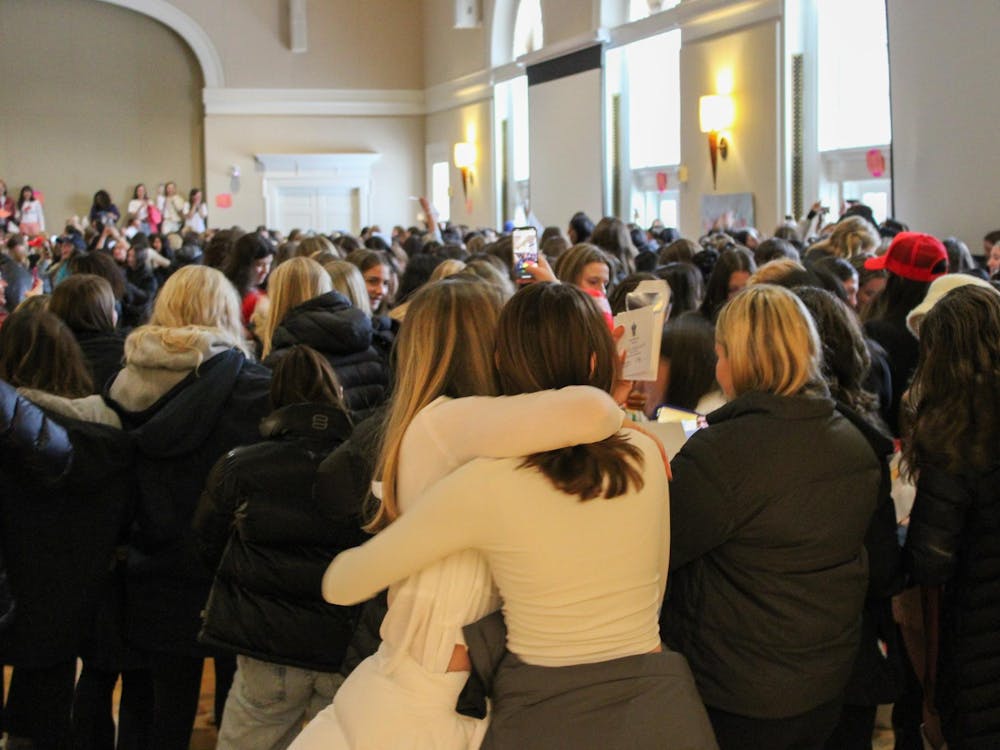Freezing temperatures, fresh classes and formal sorority recruitment marked the beginning of the spring semester for 794 first-year girls at the University.
Within the week, many girls became members of Greek sisterhoods that will mark their social lives, and T-shirt collections, for the next four years.
But what about the rushees who did not join a sorority?
"While we hope that every woman who participates in Recruitment will find her ideal match, and we believe she is very likely to given the depth and breadth of our community, it ultimately is a personal decision as to whether or not a woman decides to join a chapter," said Chelsey Iaquinto, the Inter-Sorority Council's vice president for recruitment, in an e-mail.
Although Iaquinto explained that it was uncommon for girls to withdraw from rush, many students do not go through with it or do not complete the process every year. Other students, upon receiving bids, decline. Still others accept the bids, then deactivate a day, a week or a semester after pledging.
Second-year College student Danielle Murashige signed up to rush last spring but decided not to before it even started, citing a lack of prior information as her reason for not participating. Although the ISC does provide Recruitment Counselors for the rushees, many girls come into the process already knowing a significant amount about the houses, which may make those girls who are less informed feel ill-prepared.
In the end, though, Murshige noted that the less-informed girls probably had the best experiences during recruitment, joking that girls who could not tell one Greek letter from another that probably fared best during the process.
"The girls who had the best time rushing were those who didn't know anything about the Greek system," she said, adding that these girls entered each house more open-minded.\nUltimately, Murashige gave recruitment another try this year and accepted a bid.
Apart from a lack of information, second-year College student Vicki Greenberg explained that first-year students may find the recruitment experience incredibly stressful and thus choose not to join the Greek system.
"I was really judgmental going into the process," she said. "I only wanted to be in one of two houses. After they cut me, I didn't want to do it anymore and dropped out."
Several students find themselves in situations similar to Greenberg's every year. The social aspect of sorority life can be incredibly appealing to girls who have had their eyes on certain Greek houses, and the end of the recruitment process can be heartbreaking.
"It allows people to get involved," first-year College student Abbi Sigler said.
Similarly, second-year College student Julia King said she rushed and pledged during her first year in an attempt to find bonds of sisterhood at the University. After attending an all-girls high school, she already was accustomed to a sense of female camaraderie and wanted to reclaim that same feeling.
Though she loved the process, the diversity of her pledge class constantly amazed her.
"There were girls who would tan twice a week and had platinum blonde hair, and other girls who were really quiet and studious," she said. "I wondered, how did we get to the same place?"
King eventually deactivated the summer after her first year for several reasons, including the hefty fees that are associated with joining.
Greenberg ended up giving the Greek system another try this past fall. She informally rushed and accepted a bid because she "just wanted to meet people," she said.
Sigler decided not to go through with formal recruitment as she continues to adjust to University life. She added that she is considering exploring her passion for community service by rushing Alpha Phi Omega or by becoming more involved with Madison House.
Second-year College student Nancy Park chose not to finish out the formal recruitment period last year, citing similar reasons as Sigler.
"It was kind of a challenge at first," she said, "especially when all the people around me were pledging."
Given time, though, Park became more and more comfortable with her decision. As the current Second-Year Council vice president and a resident adviser in Maupin dormitory, Park admits that she would not have had the time for all of these other activities had she gone Greek.
"I'm grateful I have more time to invest deeper into the activities I'm involved with," she said.





